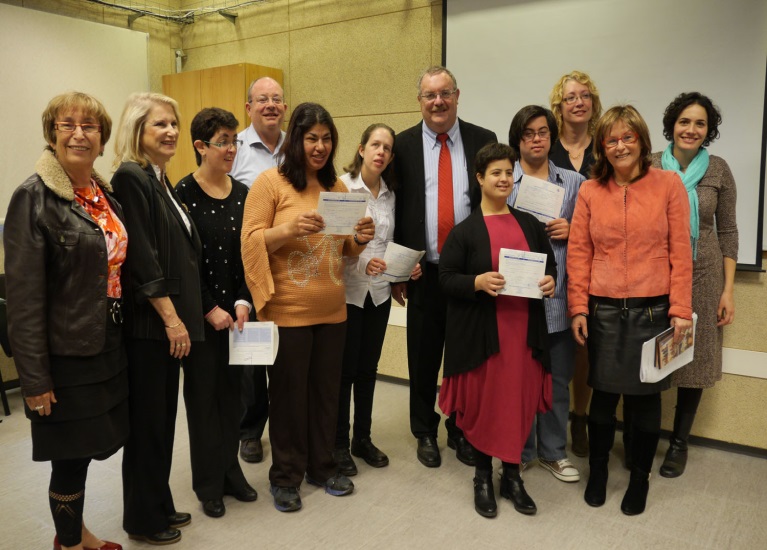
Higher Education: Empowering Everyone, Part II
The Bar-Ilan University Empowerment Program in Israel was one of five global winners of the 2014 Ruderman Prize in Inclusion. Professor Hefziba Lifshitz-Vahav, head of the program, sat down with us for a brief interview. Below is part two of the interview where she discusses higher educational opportunities in Israel for people with intellectual disabilities in comparison to the rest of the world and what opportunities higher education opens for students. Part one can be found here.
How does Israel compare to the rest of the world in providing higher education opportunities for people with intellectual disabilities (ID)?
We know about three students with Down syndrome around the world who completed a bachelor’s degree: in Japan, Spain and the United States. In all three cases, the parents took the initiative.
In recent years, there is a growing worldwide trend to offer higher education for adults with disabilities, including those with intellectual disabilities. In Canada, five universities in the state of Ontario integrate people with disabilities, including those with ID. Students who require assistance receive summaries of courses and assistance in adapting teaching materials to their needs. They take part in the social life on campus.
Projects such as this already exist in Australia, New Zealand and Ireland. In these frameworks students with ID attend three years of academic courses and at the end receive a certificate of participation in courses.
The program at Bar-Ilan requires students to complete the necessary courses to receive a B.A. Homework and studying for exams causes much emotional stress. Therefore, students finish four courses per year, which means that attaining a B.A. will take longer than three years. Unlike other existing programs around the world, our emphasis is academic, so we actively seek to ensure that the students will complete a bachelor’s degree.
I think that 5% of those with intellectual disabilities can fully participate in university life. Unfortunately, Israel’s National Insurance does not recognize this capability. They fund academic studies for students with many types of disabilities, including: learning disability, physical disability, sensory impairment among others- but not students with ID. This needs to change.
Does higher education help students in finding employment?
In Canada, studies show that higher education impacts the field of employment. Graduates find it easier to find work in the open market. However, the types of jobs they are finding remain similar to what they have always been offered: waiting tables, supermarket sales and menial jobs such as those. We believe that their abilities are not being fully explored and there are many potential employment opportunities out there for people with ID. We have some ideas we are working on to change the status quo.
What opportunities does higher education open for students with ID?
Right now, the most important outcome of our program is changing public attitudes towards people with intellectual disabilities. The ‘regular students’ who learn with students with ID have also undergone a transformation, as they see full inclusion up close.
The project has also caused university professors and administrators to change their perceptions of people with ID. Current university president Rabbi Prof. Daniel Hershkowitz met the students last year and after seeing and hearing of their abilities remarked: “These are people with hidden capabilities.” That says it all!
We have been surprised by their abilities. They have participated in computer courses (Dr. Sigal Eden) and learned to create technological learning software for children with disabilities. They have learned scientific theories. They learn with partners which means they can express and share their views with other students, making the learning experience an interactive one.
At the end of the day, the biggest benefit is for the students themselves: not only does it strengthen their cognitive abilities but higher education empowers them while contributing greatly to their self-worth and self-image.
Hefziba Lifshitz-Vahav is an Associate professor in the School of Education, Bar-Ilan University in Israel. She established and heads the new MA program in Intellectual Disability (ID) which is the first of its kind in Israel. She holds the Lois Alberto Machado Chair for Research on Cognitive Modifiability and the Development of Intelligence in the School of Education of Bar-Ilan University and the Baker center for study and development of infants and children with ID. Her research area focuses mainly on lifelong learning in a population with ID as well as adulthood and aging of individuals with ID. She is the head of Empowerment project: three stages of inclusion in the academic world for adults with ID.
About the author
Stay Included
To stay up to date on our most recent advocacy efforts, events and exciting developments, subscribe to our newsletter and blog!





















